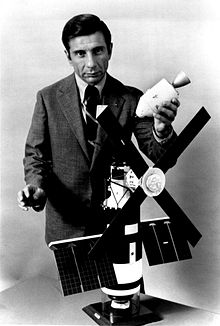Jules Bergman
| Jules Bergman | |
|---|---|

|
|
| Born |
March 21, 1929 New York City |
| Died | February 11, 1987 (aged 57) New York City |
| Occupation | News writer, television and radio broadcaster, science editor |
| Years active | 1949 – 1986 |
Jules Bergman (March 21, 1929 – February 11, 1987) was an American broadcast writer and journalist who served as Science Editor for ABC News from 1961 until his death in 1987. He is most remembered for his coverage of the American space program.
A native of New York City, Bergman was educated at the City College of New York and Indiana University. While doing postgraduate work at Columbia University, Bergman held a Sloan-Rockefeller Advanced Science Writing Fellowship, which he completed in 1960.
Bergman began his journalism career in 1949 at Time magazine. He briefly worked at CBS News, then joined the news staff of WFDR-FM in New York, eventually becoming the station's assistant news director.
Bergman joined ABC News as a writer in 1953, specializing in science issues. In the late 1950s he began covering the activities of the Space Task Group. Bergman was named Science Editor in 1961, the same year that the first manned Vostok and Mercury flights took place.
Though he became most famous for his work on covering space missions, Bergman covered stories in a range of areas, including aviation, defense matters, medicine, health, astronomy and public safety. He was pressed into service as a general assignment reporter on some special occasions. For example, after the assassination of President John F. Kennedy on November 22, 1963, Bergman was sent to New York's Times Square to report on citizens' reactions to the President's death.
Bergman began covering developments in space exploration during the 1950s. He went on to cover the entirety of the Mercury, Gemini, Apollo, Skylab and Apollo-Soyuz programs for ABC.
...
Wikipedia
